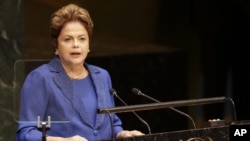Brazil President Dilma Roussef says because her country is a strong democracy it has been successful in education, health care, economic expansion and social justice at a time when much of the world has struggled with the devastating effects of the financial crisis.
During the opening session of the U.N. General Assembly in New York, Roussef said because Brazil has stayed true to its democratic principles, it no longer appears on the World Hunger Map, has generated 21 million jobs and raised the country’s standard of living.
She said Brazil has reduced child mortality before the deadline set by the U.N. Millennium Development Goals.
In her speech to leaders gathered from around the globe, Roussef said Brazil's economic success has made universal access to primary education a reality.
"Vocational education has made strides with the creation of hundreds of new schools and the professional technical training of eight million young people over the last four years,” she said.
She said Brazil is not interested in becoming involved in international conflicts.
"With respect to the persistence of the question of Palestine; the systematic massacre of the Syrian people; the tragic national de-structuring of Iraq; the serious insecurity in Libya; the conflicts in the Sahel; and the clashes in Ukraine, outside military intervention would lead not to peace, but to the deterioration of these conflicts,” she said.
During her U.N. speech the president also discussed deforestation, saying that “In the last decade, Brazil has reduced deforestation by 79 percent, without relinquishing economic development and social inclusion.”





